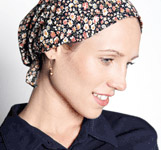Frum and the Male Gaze

Do religious requirements for girls and women to cover their bodies encourage eating disorders?
by Adina Judy Bernstein
For a number of years, I have been obsessed with understanding, studying, and observing tsniut (modesty)—particularly how this value is supposedly “embodied,” quite literally, in the dress codes practiced by Orthodox Jews and emphasized for women. There seems to be an almost ubiquitous, persistent, and explicit association of dress codes with body image and, specifically, eating disorders.
Proponents of body covering argue that covering women’s bodies is some sort of Shangri-la; a pragmatic vehicle of neo-feminist empowerment and a potential solution to a whole host of eating disorders:
| When women adopt tsniut, interesting things happen. A “complier”— who has struggled to be thin in order to please men—often puts on some healthy pounds. […] A “rejectionist”—who has gained weight in order not to please men—often finds she can now be slim whilst still being a person. —Gila Manolson, Orthodox Jewish outreach educator |
Yet, the “body covering and eating disorders” discussion is not limited to the world of ultraorthodox kiruv (outreach). I regularly read and hear feminist critics rail against the more orthodox communities in which they grew up: They say marriage and dating pressure play a part in many young women’s eating disorders, and the Internet abounds with horror stories of men who have turned down shidduchim (dating match suggestions in religious communities) based on the girl’s dress size being larger than a size 8. In contrast to Manolson, feminist critics suggest that the required dress codes for Orthodox women create and perpetuate an obsession with body parts, which subjects women to an additional “male gaze” beyond that of society at large; a religious male gaze that allows constant male checks, notes, and judgments of how covered-up a young woman’s body is. Again, tsniut is related with body image, this time negatively.
A notable female blogger, Elana Sztockman of Kolech (the Israeli religious feminist organization), writes:
| Women are told to dress “modestly” as an “antidote” to the problems of body that exist for women in the secular world—as if putting on layers of clothing is healthy for a woman trying to experience her own body […] Laws of modesty protect women? I vehemently disagree. Excess layers of clothing do not protect women from the imposed sexualized gaze upon their bodies, especially not the way Orthodoxy is practiced. When girls as young as five are told to cover up because men are looking at them, this is not protection but over-sexualizing. |
I am not going to argue for or against either of these perspectives. I remember reading an article some time ago that said anorexia rates were equally high across the Orthodox communities, from the liberal Modern Orthodox to the more yeshivish. Anorexia, it seems, is an equal opportunity disease. I’m sure that the way any dress code is taught in any community will have an impact on the way young women come to understand their bodies and their clothes. Yet, here, I fear both sides may be playing a dangerous game of finger pointing. One group of people believe that secular society, with all its male pressures on women’s bodies, causes eating disorders—and they eschew this society and encourage women to cover their bodies. Another group of people are somewhat more open to secular society and eschew strictly orthodox dating and dress codes, and they believe that those communities in which women cover up and shidduch date are the ones with the eating disorders problem. If ‘we’ can point the finger at ‘them,’ we avoid looking at ‘us’.
I recall a similar situation when my mother was volunteering with a charity that helped Jewish victims of domestic abuse. Sometimes, women in her local traditional/modern orthodox community would comment to her that domestic abuse was “”obviously only a problem among the ultraorthodox”” without realizing how blind they were being to the problems within their own community. Body image, depression, domestic abuse, loneliness, anorexia are issues for the whole community. Do we regularly applaud the growing number of people across all parts of the Orthodox community who are doing their utmost to address eating disorders, domestic abuse, and other problems? Do we thank them for facing up to reality?
When we judge, and when we apportion blame for tragic eating disorders to other people’s communities, we blind ourselves to the challenges within our own communities. Instead, we need to open the conversation within the Orthodox world about body and body image and self-esteem. Ultimately, our collective body image as a community is going to be about how we judge, count, and value people and their achievements, and how we support those amongst us who are struggling for whatever reason.
About the Author
Adina Judy Bernstein
Adina Judy Bernstein grew up in London, England, and studied history and theology at Cambridge University. She was an intern at the Hadassah Brandeis Institute in the summer of 2009, where she made a short documentary film about how two Jewish mothers and daughters teach one another about tsniut (modesty). Adina Judy Bernstein has studied three times at Nishmat seminary in Jerusalem and has also taken classes at The Conservative Yeshiva, Neve Yerushalayim, as well as at a small Hasidic school named Simchat Shlomo. She currently lives in London.
There are no comments yet, add one below.






Leave a Comment